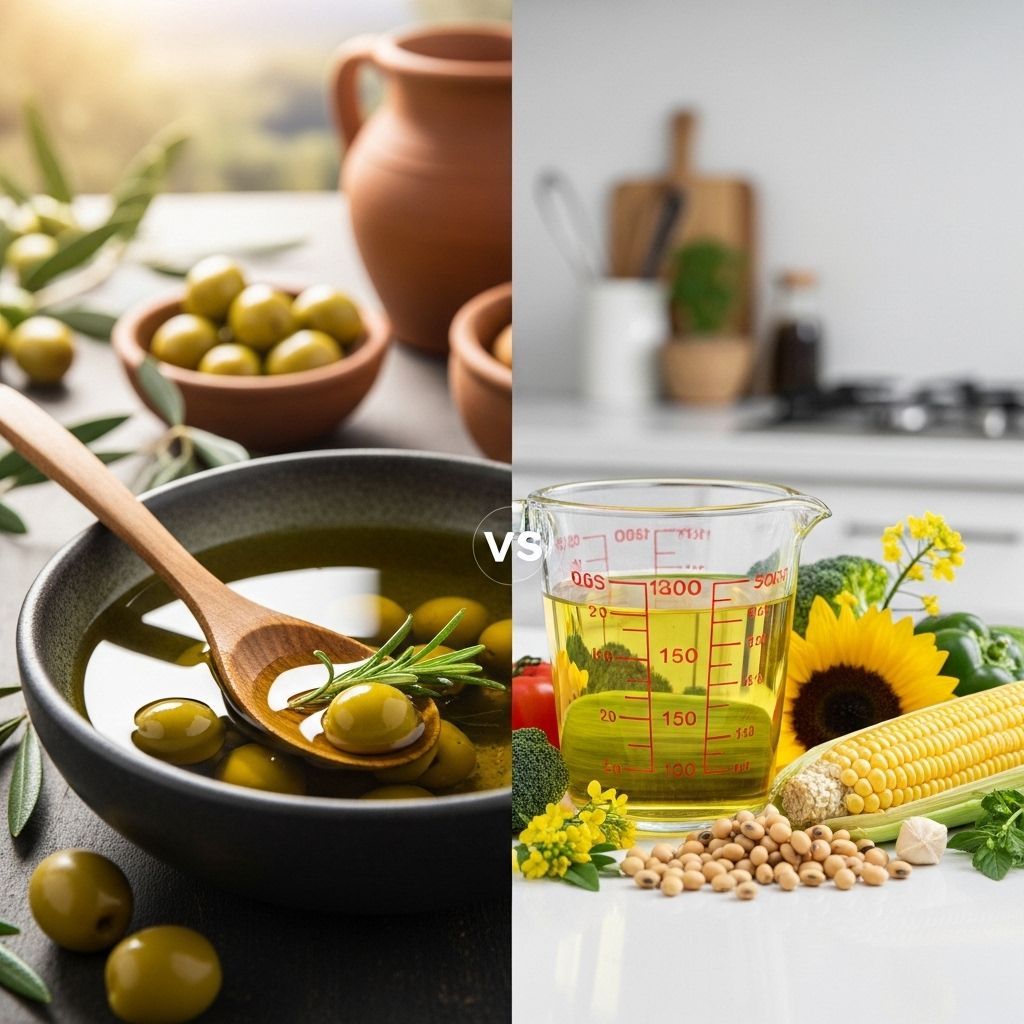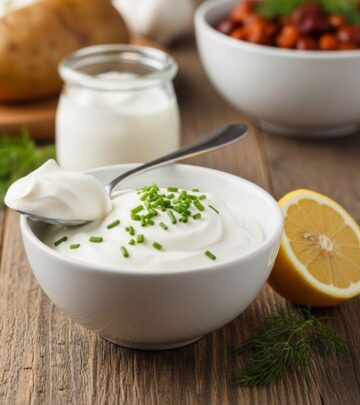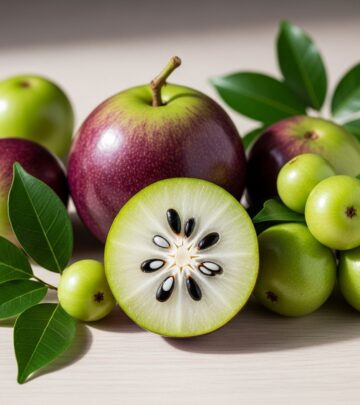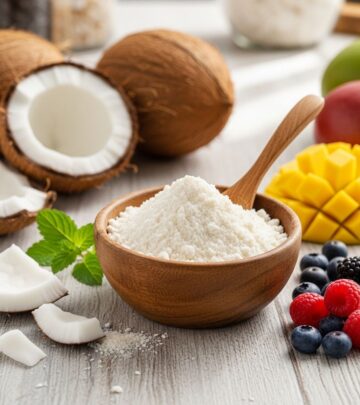Olive Oil vs. Vegetable Oil: A Comprehensive Comparison of Health, Nutrition, and Culinary Uses
Each oil brings unique flavors, nutritional profiles, and heat stability to your kitchen.

Olive Oil vs. Vegetable Oil: Understanding the Key Differences
Cooking oils play a significant role in our diet and health. Among the most frequently debated choices are olive oil and vegetable oil. Understanding the differences between these staples—from their nutritional content and processing methods to their culinary uses and health impacts—can help you select the best option for your lifestyle. This article delves into every aspect of the olive oil versus vegetable oil debate and provides evidence-based guidance for your kitchen and well-being.
Table of Contents
- What Are Olive Oil and Vegetable Oil?
- Extraction and Processing Methods
- Nutritional Comparison
- Culinary Uses and Flavor Profiles
- Health Benefits and Risks
- Smoke Point and Cooking Suitability
- Comparison Table: Olive Oil vs. Vegetable Oil
- Pros and Cons at a Glance
- Frequently Asked Questions (FAQs)
What Are Olive Oil and Vegetable Oil?
Olive oil is obtained by pressing the fruits of the olive tree (Olea europaea). It ranges from minimally processed extra virgin olive oil (EVOO) to more refined products. In contrast, vegetable oil is a generic term for oil extracted from various plant sources. Most commercial vegetable oils are blends of canola, soybean, corn, sunflower, safflower, or cottonseed oils, resulting in a neutral flavor and high versatility in cooking.
- Olive oil comes specifically from olives.
- Vegetable oil is typically a blend and can include sunflower, canola, corn, and soybean oils.
Extraction and Processing Methods
The way an oil is produced influences its nutrition, taste, and health effects.
Olive Oil Processing
- Extra Virgin Olive Oil (EVOO): Made by cold-pressing olives. Minimal mechanical and no chemical processing means the oil retains antioxidants and the olives characteristic flavor.
- Virgin and Refined Olive Oils: Undergo additional processing that reduces flavor and antioxidants, resembling some of the characteristics of vegetable oil.
Vegetable Oil Processing
- Usually made from a blend of plant oils, extracted with high-heat and often solvent-based processes, such as using hexane.
- Vegetable oil is highly refined: degummed, deodorized, and bleached. Processing removes most flavor, color, and naturally occurring nutrients.
Nutritional Comparison
Both olive oil and vegetable oil are rich in unsaturated fats, but their detailed composition differs:
| Feature | Olive Oil | Vegetable Oil (Typical blend) |
|---|---|---|
| Main Fat Type | Monounsaturated (esp. oleic acid) | Polyunsaturated (omega-6, some omega-3), varies by blend |
| Vitamins & Antioxidants | High in vitamin E, vitamin K, polyphenols (in extra virgin) | Very low after processing |
| Processing | Minimal for EVOO; more for refined | Heavily refined |
| Trans Fats | Negligible in minimally processed varieties | Potential trace amounts due to refining |
| Omega-6 to Omega-3 ratio | Low (healthier balance) | High in omega-6, low in omega-3 |
Extra virgin olive oil stands out for its high antioxidant content and its predominance of heart-healthy monounsaturated fats, which are stable during cooking and linked to various health benefits.
Culinary Uses and Flavor Profiles
Choosing an oil often depends on its taste and how it behaves in cooking:
- Olive oil (EVOO) has a distinct, robust, slightly peppery flavor ideal for salads, dressings, drizzling, sautéing, and dipping bread. The characteristic taste can enhance Mediterranean and rustic dishes.
- Vegetable oil is valued for its neutral flavor, making it suitable for baking, frying, and recipes where you dont want the oil to dominate the taste.
When substituting, it is important to note that the flavor of olive oil can impact dishes that call for a more neutral oil. Conversely, using vegetable oil in place of olive oil will not provide the depth of flavor olive oil can impart.
Health Benefits and Risks
Benefits of Olive Oil
- Heart Health: Rich in monounsaturated fats and polyphenols, which are well-researched for lowering LDL (bad) cholesterol while raising HDL (good) cholesterol. Associated with reduced risk of cardiovascular disease and stroke.
- Anti-Inflammatory: High content of antioxidants and bioactive compounds, such as oleocanthal, can reduce inflammation.
- Cognitive Protection: Some studies report improved cognitive function and reduced risk of age-related decline in people who consume extra virgin olive oil regularly.
- Weight Management: Due to high satiety and nutritional value, can be a good part of moderate-fat diet plans.
Risks and Considerations with Olive Oil
- Higher cost compared to vegetable oil.
- Distinct taste may not suit every recipe.
- Refined and low-quality olive oils lack many of the health benefits of extra virgin varieties.
Benefits of Vegetable Oil
- Affordability: Less expensive; widely available.
- Neutral Flavor: Preferred in recipes where oil flavor should not dominate.
- High-Heat Cooking: Many blends are suitable for baking, frying, and roasting due to their relatively high smoke point, though not always their stability under high heat.
Risks and Considerations with Vegetable Oil
- Highly Processed: Nutrients and antioxidants stripped during processing; mainly empty calories.
- High Omega-6 Fat Content: Excess omega-6 (polyunsaturated) fatty acids and a high omega-6 to omega-3 ratio may promote inflammation when consumed in large amounts relative to omega-3.
- Potential Trans Fats: Industrial processing can introduce trace trans fats.
- Sensitivity to Heat, Light, Oxygen: Prone to oxidation, which can create harmful compounds and make the oil rancid more quickly, especially when exposed to heat.
Smoke Point and Cooking Suitability
The smoke point is the temperature at which oil starts to break down, smoke, and potentially form harmful compounds. It is often used to judge an oil’s suitability for various cooking techniques:
- Extra Virgin Olive Oil: Smoke point around 390°F (200°C).
- Vegetable Oil: Typical blend has a smoke point around 400°F (205°C).
Both oils work for sautéing and moderate pan-frying. For deep frying and high-heat searing, refined vegetable oils are more commonly used, but it’s important to note that high smoke point does not always mean stability—especially for high-polyunsaturated vegetable oils, which are sensitive to oxidation.
Comparison Table: Olive Oil vs. Vegetable Oil
| Aspect | Olive Oil | Vegetable Oil |
|---|---|---|
| Source | Only olives | Blend of plant oils (e.g., canola, soy, sunflower) |
| Main Uses | Salads, drizzling, sautéing, bread dipping | Baking, frying, high-heat cooking |
| Flavor | Distinct, fruity, sometimes peppery | Neutral |
| Antioxidants | High in extra virgin varieties | Minimal after processing |
| Price | Generally higher | Lower, budget-friendly |
| Processing | Minimal (EVOO), more for refined forms | Intensive (multiple refinement steps) |
| Health Impact | Heart and brain benefits, anti-inflammatory | Neutral or potentially inflammatory (high omega-6) |
| Micronutrients | Vitamin E, vitamin K, polyphenols (EVOO) | Very little |
| Suitability for High Heat | Moderate | High (though oxidative stability varies) |
Pros and Cons at a Glance
Pros of Olive Oil
- Rich in monounsaturated fats and beneficial plant compounds
- Supports heart and cognitive health
- Antioxidant-rich when extra virgin
- Flavorful and versatile in many dishes
Cons of Olive Oil
- More expensive than vegetable oil
- Distinct flavor may not fit all recipes
- Not suitable for very high-heat cooking
Pros of Vegetable Oil
- Neutral taste, won’t interfere with subtle recipes
- Cheaper and more widely available
- Versatile, especially for baking and deep frying
Cons of Vegetable Oil
- Highly processed, stripped of most nutrients
- High in omega-6 fatty acids, may promote inflammation
- Possible presence of trace trans fats
- Oxidizes quickly, especially when heated
Frequently Asked Questions (FAQs)
Can I substitute olive oil for vegetable oil in recipes?
Yes, in many baked goods, salad dressings, or sautéed dishes, olive oil can replace vegetable oil one-to-one. However, extra virgin olive oil’s distinct flavor may alter the recipe. For delicate baking or where a neutral flavor is essential, vegetable oil is a preferable choice. Olive oil should not be used for high-heat frying since its flavor and healthful compounds degrade.
Which oil is better for heart health?
Extra virgin olive oil is superior for heart health due to its high monounsaturated fat content and antioxidants, which have proven benefits for cholesterol and inflammation. Vegetable oil blends are often high in omega-6 polyunsaturated fats, which, when consumed excessively, may worsen inflammation and are generally less beneficial for cardiovascular health.
Does vegetable oil have any health benefits?
Vegetable oil provides concentrated energy and is inexpensive and flavorless, making it useful in cooking. However, it is largely stripped of vitamins, minerals, and antioxidants during refining and, if consumed excessively, could negatively impact cardiovascular and metabolic health due to its high polyunsaturated omega-6 content.
Can I mix olive oil and vegetable oil?
Yes. Mixing these oils in any ratio is safe and can moderate the flavor of olive oil or increase the smoke point for certain recipes. If you’re running low on one, it’s fine to combine them for cooking or baking.
How should oils be stored to maximize freshness?
Both olive oil and vegetable oil should be stored in a cool, dark place in tightly sealed bottles to slow oxidation and prevent rancidity. Extra virgin olive oil is especially sensitive to heat, light, and air exposure.
Choosing the Right Oil for You
The healthiest option for most people is to prioritize minimally processed extra virgin olive oil for its proven health advantages, while using vegetable oil sparingly and primarily when a neutral flavor or higher smoke point is needed. Balancing your intake and combining oils strategically according to recipe and health needs can help support both flavor and well-being.
References
- https://www.healthline.com/nutrition/olive-oil-vs-vegetable-oil
- https://www.goodrx.com/well-being/diet-nutrition/vegetable-oil-vs-olive-oil
- https://oliveoillovers.com/blogs/our-journal/olive-oil-versus-canola-and-other-vegetable-oils
- https://brightland.co/blogs/field-notes/olive-oil-vs-vegetable-oil
- https://www.aboutoliveoil.org/olive-oil-vs-vegetable-oil
- https://www.medicalnewstoday.com/articles/324844
Read full bio of Sneha Tete













